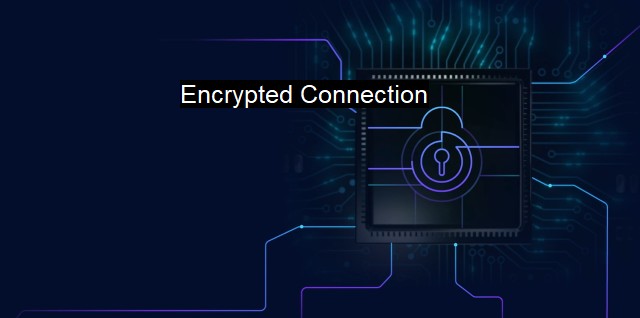What is Encrypted Connection?
The Importance of Encryption Technology in Cybersecurity: Ensuring Secure Connections and Protecting Sensitive Information
An encrypted connection refers to a security technique designed to protect data transmitted over a network by maximizing information confidentiality, data integrity, and user authenticity. It encrypts the data transferred between two entities in a way that outsiders or unauthorized agents cannot eavesdrop or maliciously modify the data, effectively maintaining the confidentiality, integrity, and authenticity of the exchanged information.Encryption is a procedural system to secure data which involves mathematical algorithms to jumble data into mixed, unrecognizable strains. The only way to resolve and display the data back to its initial state is by decoding using the right decryption key. Hence, through this prevention of unauthorized access to one’s electronic data, an entity forming an encrypted connection can communicate securely with their end recipient.
This principle of encapsulating information with an encryption algorithm serves as the lifeline for forming an encrypted connection, paving way for enhanced cyber security. Crucial online sectors like online banking, e-commerce and social media heavily rely on this security protocol to prevent the fiscal and private information of users from falling prey to illegal channels, hacks and leaks.
An encrypted connection is of paramount importance and ubiquity, handling not just private browsing but extending up to antivirus programs. Usually, even institutional and enterprise-level security parameters consider encrypted connections as a quintessential institute for cybersecurity measures, be it for the transmission of unclassified or classified information.
Antivirus protections incorporate encryption methods to secure the user's data and the entire system. Antivirus software typically develops vigilance against known types of privacy breach activities, such as viruses, worms, or Trojan horses, and strives to protect your services from being hampered by these threats. Several antivirus systems also study program actions to accomplish any suspicious exploit indicative of malicious code established by cybercriminals.
When an antivirus solution scans existing files or observes an ongoing downloading process, the implemented data encryption ensures that during these operations, the privacy of files and documents stays uncompromised. Cybersecurity solutions often implement database encryption and secure sockets layer encryption rendering the data unreadable to an unauthorized person who might trespass network boundaries.
Preventing exposure of unencrypted data and code while modifications are being brought in or malicious files being identified and isolated forms the uniqueness of any prominent cybersecurity tool like antivirus software. Antivirus not only excels in cracking down threats when encountered in real time, but are also consistent enough to deliver this round the clock functionality while maintaining the real-time integrity of the system and network.
If contemplated upon, encrypted connections are essentially giving rise to the accountabilities, ethics, and best practices around cybersecurity. Instances where misinterpretation or ambiguity exits around data privacy, encrypted connections ensure authentic performance of data exchange by implementing its security barriers.
The bottom-line is, an encrypted connection forms an essential device of the cybersecurity domain acting as a shield from potential threats launched by hackers who continuously devise new techniques of breaching security norms. Amid increasing instance of organized cyber-crimes and advanced persistent threats, technological adherence to encrypted connections mapped with proactive antivirus mechanisms will always stride towards strengthening a resilient cyber defense mechanism.
Successful cybersecurity approaches tend to maintain and follow the standard form of having to encrypt all sensitive data before transmission, protect networks with strong firewall policies, persistently update applications in order to avoid outdated susceptibilities and have the modern antivirus techniques duly incorporated. Knowledge and awareness about encrypted connections are therefore vital, regardless of organization size or transaction quantity for ensuring digitally securitized daily operations.

Encrypted Connection FAQs
What is an encrypted connection?
An encrypted connection is a secure connection established between two devices or networks that ensures privacy, authenticity, and integrity of data transmitted over the connection. When data is transmitted over an encrypted connection, it is converted into an unreadable format that can only be deciphered by the intended recipient with the right decryption key.Why is it important to use encrypted connections in cybersecurity?
Encrypted connections are critical for cybersecurity because they protect sensitive data from being intercepted, modified, or stolen by cybercriminals. Without encrypted connections, hackers can easily eavesdrop on the traffic flowing between devices and networks, and use the information for malicious purposes. By using encrypted connections, cybersecurity professionals can ensure that data remains private and secure.How can I tell if a website has an encrypted connection?
You can tell if a website has an encrypted connection by looking at the URL in your browser's address bar. If the URL begins with "https" instead of "http", then the connection is encrypted. You may also see a padlock icon next to the URL, indicating that the connection is secure.Do antivirus programs use encrypted connections?
Antivirus programs may use encrypted connections to perform certain tasks, such as downloading updates or sending data to the vendor's servers for analysis. Encrypted connections help ensure that the data being transmitted is secure and cannot be intercepted by cybercriminals. However, not all antivirus programs use encrypted connections, so it's important to check the program's settings to see if it offers this feature.| | A | | | B | | | C | | | D | | | E | | | F | | | G | | | H | | | I | | | J | | | K | | | L | | | M | |
| | N | | | O | | | P | | | Q | | | R | | | S | | | T | | | U | | | V | | | W | | | X | | | Y | | | Z | |
| | 1 | | | 2 | | | 3 | | | 4 | | | 7 | | | 8 | | |||||||